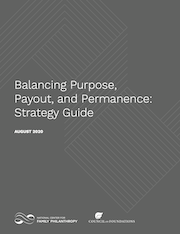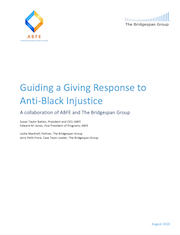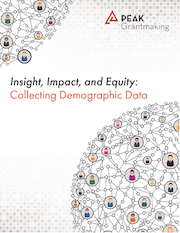Site Search
- resource provided by the Forum Network Knowledgebase.
Search Tip: Search with " " to find exact matches.
Publication Date: August, 2020

... the Council on Foundations, the National Center for Family Philanthropy has released Balancing Purpose, Payout, and ...
Resource Type: Resource Guide
Publication Date: August, 2020

... additional input from proximate leaders. This memo offers philanthropy potential paths to invest in organizations and ...
Resource Type: Resource Guide
Publication Date: July, 2018

... live their values through their grantmaking practices. For philanthropy to advance equity in all communities, especially ...
Resource Type: Research
Audience: All Funders
Funding Area: Racial Equity
Publication Date: June, 2014
... and a bold plan of action to maximize the potential of philanthropy and the private sector to increase opportunity ...
Resource Type: Issue Briefing
Audience: Board/Trustees
Funding Area: Public Social Benefits
2020, we hope, is a year like no other for philanthropy. The hope and promise of the new year, quickly ...
News Type: CNJG News
... June grant cycle. The Summit Foundation fosters philanthropy by identifying local needs and offering donors ...
News Type: News
... In Aging, Grantmakers In Health, and Disability & Philanthropy Forum. Coming together for the first time across ...
Event Type: Partner
Audience: All Funders
... donations. Then, applying the concept of collective philanthropy, they meet annually to recommend grants to local ...
News Type: News
Topic: Grantmaking
This program is presented in partnership with the Maryland Philanthropy Network. As the number of organizations in ... program is presented in partnership with the following philanthropy-serving organizations: Maryland...
Event Type: Partner
Audience: All Funders
... and girls by “addressing their unique challenges through philanthropy.” Jewish Women’s Foundation of New Jersey ...
News Type: News
Publication Date: March, 2015

... to service-centered giving as a constructive branch of philanthropy. Many donors now view public-policy reform as a ... recipients to take advantage of. Yet public-policy philanthropy has special ways of mystifying...
Resource Type: Best PracticeResource Guide
Audience: All Funders
Topic: Grantmaking
Funding Area: Civil/Advocacy/Policy
... childcare, tax relief, extra SNAP benefits, additional resources for unemployed workers and small businesses, ... and how the overall social sector might better utilize resources and tools during these unprecedented...
Event Type: Funder Briefing
Audience: All Funders
Topic: COVID-19
Publication Date: October, 2022
A corporate funder asked our corporate funder listserve about how the corporate foundation is funded either through an endowment or through periodic transfers, or though a share of the profits? This document is a compilation of the responses on the...
Resource Type: CNJG Documents/Reports
Audience: Corporate Giving
... of the pandemic Two special 10th Anniversary Grants of $20,000 each, one in the area of Arts & Culture and the other ...
News Type: News
Topic: Grantmaking
... in applications and $1.2 million in total giving—a 20% rise from last year’s $1 million. Representatives from ...
News Type: News
Topic: Grantmaking
The Council of New Jersey Grantmakers invites members – and prospective members – from across the state to gather for an evening of connection and community. Rooted in CNJG’s mission of fostering shared learning, collaborative and trusting...
Event Type: Meeting
Audience: All Funders
... to over 100 historical organizations, museums, historic sites, archives, libraries, individuals, and county re-grant ...
News Type: News
Topic: Grantmaking
... impact state budgets, including in our own state. United Philanthropy Forum makes clear in their statement following ... harm communities and people that the social sector – philanthropy and nonprofits – work to...
... and Virginia region has been no exception. Private philanthropy is also working with the current wave of ... , Senior Research Associate, Center on Nonprofits and Philanthropy, Urban Institute @BenSoskis Sonia Torres...
News Type: Newark Liaison
Audience: All Funders
Topic: COVID-19
These news articles show our members responses to philanthropy's role in fighting against racism and injustice. ... at RWJF, pens this article re-imagining the work of philanthropy New Jersey Council for the...
